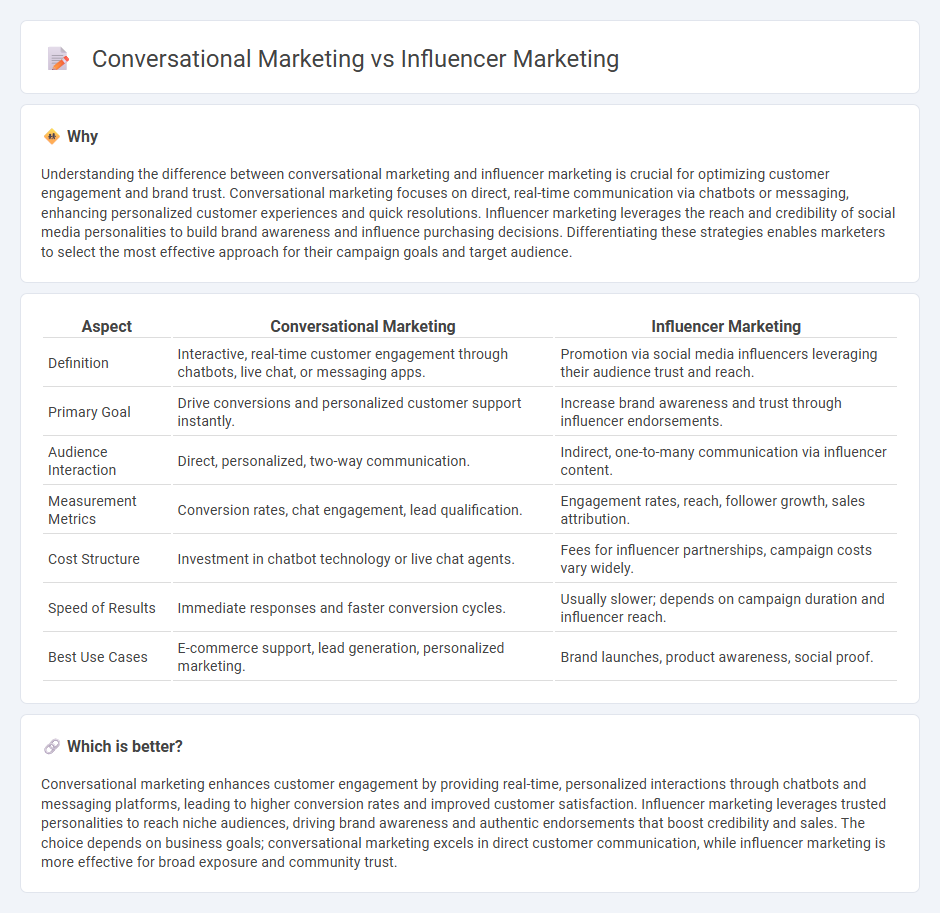
Conversational marketing leverages real-time, personalized interactions through chatbots and messaging apps to engage customers and drive immediate responses. Influencer marketing focuses on partnering with individuals who have significant social media followings to authentically promote brands and expand reach. Explore deeper insights into how these strategies can transform your marketing approach.
Why it is important
Understanding the difference between conversational marketing and influencer marketing is crucial for optimizing customer engagement and brand trust. Conversational marketing focuses on direct, real-time communication via chatbots or messaging, enhancing personalized customer experiences and quick resolutions. Influencer marketing leverages the reach and credibility of social media personalities to build brand awareness and influence purchasing decisions. Differentiating these strategies enables marketers to select the most effective approach for their campaign goals and target audience.
Comparison Table
| Aspect | Conversational Marketing | Influencer Marketing |
|---|---|---|
| Definition | Interactive, real-time customer engagement through chatbots, live chat, or messaging apps. | Promotion via social media influencers leveraging their audience trust and reach. |
| Primary Goal | Drive conversions and personalized customer support instantly. | Increase brand awareness and trust through influencer endorsements. |
| Audience Interaction | Direct, personalized, two-way communication. | Indirect, one-to-many communication via influencer content. |
| Measurement Metrics | Conversion rates, chat engagement, lead qualification. | Engagement rates, reach, follower growth, sales attribution. |
| Cost Structure | Investment in chatbot technology or live chat agents. | Fees for influencer partnerships, campaign costs vary widely. |
| Speed of Results | Immediate responses and faster conversion cycles. | Usually slower; depends on campaign duration and influencer reach. |
| Best Use Cases | E-commerce support, lead generation, personalized marketing. | Brand launches, product awareness, social proof. |
Which is better?
Conversational marketing enhances customer engagement by providing real-time, personalized interactions through chatbots and messaging platforms, leading to higher conversion rates and improved customer satisfaction. Influencer marketing leverages trusted personalities to reach niche audiences, driving brand awareness and authentic endorsements that boost credibility and sales. The choice depends on business goals; conversational marketing excels in direct customer communication, while influencer marketing is more effective for broad exposure and community trust.
Connection
Conversational marketing enhances influencer marketing by enabling direct, real-time engagement between consumers and influencers, fostering authentic brand interactions. Influencers leverage conversational marketing tools such as chatbots and live messaging to create personalized experiences that build trust and increase conversion rates. This integration drives higher customer loyalty and amplifies brand visibility through interactive, dialogue-driven campaigns.
Key Terms
Influencer marketing:
Influencer marketing leverages social media personalities with large, engaged followings to promote brands authentically, driving higher conversion rates through trust and relatability. Platforms like Instagram, TikTok, and YouTube are pivotal for executing influencer campaigns that target niche demographics with precision, maximizing ROI. Explore how integrating influencer strategies can elevate your brand's visibility and customer engagement.
Endorsements
Influencer marketing leverages endorsements from popular social media personalities to build brand trust and expand reach through authentic recommendations. Conversational marketing, in contrast, emphasizes direct, real-time engagement with consumers via chatbots or messaging platforms, fostering personalized interactions rather than broad endorsements. Explore how each approach can amplify your brand strategy and strengthen customer connections.
Brand ambassadors
Brand ambassadors in influencer marketing leverage their credibility and established audience to promote products authentically, driving higher engagement and trust. Conversational marketing uses brand ambassadors to facilitate direct, real-time interactions and personalized experiences that boost customer loyalty and immediate sales. Explore how integrating brand ambassadors in both strategies can maximize marketing impact and deepen customer connections.
Source and External Links
Influencer marketing - Influencer marketing is a social media marketing strategy that uses endorsements and product placements from influencers who have expert knowledge or social influence to affect consumer buying behavior on platforms like Instagram, YouTube, TikTok, and others.
What Is Influencer Marketing? - Influencer marketing collaborates businesses with individuals who have a relevant following to increase brand exposure through targeted campaigns with clear goals, audience alignment, and appropriate budgeting.
Influencer Marketing and Why It's Important Today - Influencer marketing is important because it allows brands to reach targeted audiences authentically through trusted influencers as consumers increasingly seek genuine product endorsements over traditional ads.
 dowidth.com
dowidth.com